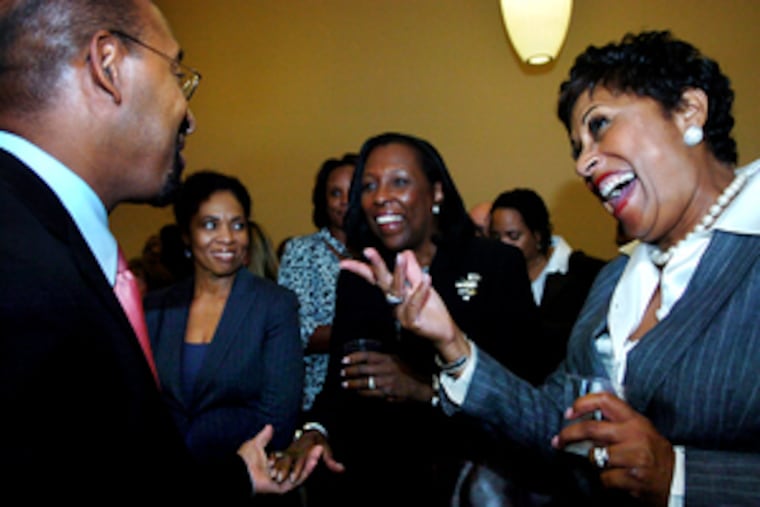Nutter's all-out dash for cash
Some question the presumptive mayor's push to attract donors.

With fewer than seven weeks to go before Philadelphia voters elect a new mayor, GOP candidate Al Taubenberger, with no bark and few bucks, would seem little threat to Democrat Michael Nutter.
You couldn't tell that, however, by Nutter's fund-raising schedule. When it comes to raising money, he is behaving as if he's in the political fight of his life.
Two weeks ago, for instance, he exited a Center City office penthouse $100,000 richer after a party called "CEOs for Nutter." Among those in attendance: Charles Pizzi, president of Tasty Baking Co.; Leonard Klehr, a partner at Lubert-Adler Real Estate Funds; and William J. Avery, past president of Crown Cork & Seal.
On Tuesday, he pulled in $75,000 from 350 business-suit-clad "Women for Nutter."
On Wednesday, Sunoco executive Edward J. Hazzouri hosted a small fund-raising dinner at the Water Works Restaurant.
On Thursday, Nutter was off to the Philadelphia Country Club in Gladwyne for another money-raising event.
And Friday morning, there was a breakfast fund-raiser with developers at Urban Outfitters at the Navy Yard.
A candidate's chasing down campaign cash is hardly unusual, of course. But for Nutter, there is an inherent tension in doing it so aggressively when no one sees his opponent as much of threat. His image as a reformer comes in part because of his efforts on City Council to rein in the influence of big donors.
At the same time, political realities are settling in for the man everyone fully expects to be mayor.
"Anyone who thinks governing doesn't take money is naive," said Leslie Miller, part of Nutter's six-person finance team.
One of the biggest reasons for rebuilding the war chest: to have money to donate to candidates for office in Washington, Harrisburg, and Philadelphia's surrounding counties, Miller said.
By giving money, donors typically gain access or influence with the candidate. In Nutter's case, he campaigned on building relationships and partnerships with political leaders from various levels of government. There are a lot of leaders, though, and that takes a lot of money.
"The mayor of Philadelphia has to be in financial position to support good candidates," including those who can help forward his agenda, Nutter said.
He isn't just seeking out new donors. He and his finance team are also methodically approaching past givers who have not contributed all they can under the city's limits for this race ($5,000 per individual and $20,000 per political committee).
The quest by Nutter, a strong proponent of the caps, speaks to his desire to balance his reform goals with political realities.
"This is a guy who really knows how to take advantage of opportunity," said Zack Stalberg, president of the Committee of Seventy, a campaign watchdog group. "It's not wrong, but it does begin to answer the question of who is Michael Nutter. Is he an outsider or an insider, or is he a reformer, or is he something else?"
Nutter is clear about his intentions.
Noting legislation he wrote that prohibits big donors from being eligible for no-bid city contracts, he said: "What I reformed is that I don't want people giving campaign contributions and getting city business."
Yet the front-runner's effort to scoop up as much cash as possible could befuddle many voters and supporters. For one thing, given Philadelphia's Democratic majority, there is nary a voter who doesn't think Nutter will step into the mayor's office come January.
"It doesn't make sense to me," said Democrat William Burton, a 48-year-old housekeeper from West Philadelphia. "He is collecting for what? He has already won."
Campaign staffers acknowledge the puzzlement. And one supporter, real estate executive Ken Balin, addressed the question head-on in invitations for the Navy Yard breakfast he hosted Friday.
"Given the city's huge Democratic majority, many have asked why Michael still needs to raise funds," Balin wrote. He then listed expenses such as "staff, media, rent and more," and added: "The message that quality candidates can raise money in an environment of campaign-finance reform must be heard."
Nutter surprised some political watchers when he demonstrated his fund-raising strength in the five-way May primary, raising and spending more than each of his rivals except businessman Tom Knox, who gave his campaign millions of dollars from his own wallet.
By contrast, Taubenberger - who has taken to calling himself the "super-underdog" - seems headed for a record low for GOP fund-raising in a mayor's race. Though he said things had picked up "considerably," Taubenberger last reported raising $20,000 in the primary, to Nutter's $4.6 million.
The Nutter campaign would not say exactly how many fund-raising events had occurred since the primary. Nor would it disclose how much more money Nutter has raised. (Finance reports are not required to be filed until next month.)
But the push for cash goes on. The campaign's "Fall Kick-Off Extravaganza," for instance, is slated for this week as a $250-per-person event at the University of the Arts.
With the campaign limits, Nutter said he had to "hustle more" to raise money. But it's a little easier being in the winner's circle. Chuckling, he said: "I have a few more friends post-primary than I did before."